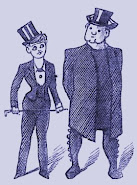Some Final Thoughts About
Jules Feiffer:
A Friend's Recollections and Assessment
by Rick Marschall
My friend -- our friend, speaking for uncountable cartoonists; fans of cartoons and comics; theatergoers; booklovers; political junkies; historians; animation fans; pop-culture aficionados; satirists; thinkers who like to laugh and laughers who like to think -- Jules Feiffer has died. He was weeks away from his 96th birthday. Even with those accumulated years, he packed much more creativity and notable achievements than many such lifespans could hold.
I will gather some memories I recently shared, and call up others. For a while I was Feiffer's editor -- not that he needed or wanted an editor; the syndicate where I worked distributed his weekly cartoon, so my job, basically, was to savor his work a few days earlier than the general public, that's all.
Jules Feiffer (January 26, 1929 – January 17, 2025) and friend
Jules Feiffer had many careers, as I suggested. Successful, extravagantly so, in terms of acceptance and honors. Specifically but not exhaustively: comic books (The Spirit); strips (his mononymous and eponymous Feiffer); books (many collections, and original titles like Passionella and Other Stories); children’s books (including A Barrel of Laughs, A Vale of Tears); animation (script for Munro, 1961 Oscar); graphic novels (Kill My Mother and others); illustration (The Phantom Tollbooth); musicals (The Man In the Ceiling); plays (Little Murders); screenplays (Carnal Knowledge and Popeye); novels (such as Harry, The Rat with Women); histories (The Great Comic-Book Heroes); autobiography (Backing Into Forward).
Feiffer's activities, titles, honors, and credits are tips of many icebergs. Everyone knows his name and his works. His wispy lines and casual compositions, even to the invariable absence of panel borders in the strips, were deceptively simple. But his work betrays a killer grasp of anatomy. (See his his favored dancing figures.)
When I was a kid, the only reason I bought The Village Voice was to read Feiffer; just as the original reason I bought The Realist was Jean Shepherd. So when I became Comics Editor of Publishers Newspaper Syndicate (previously Hall Syndicate and Field Enterprises and Publishers-Hall; and eventually News America Syndicate and North America Syndicate…) I arranged to see him in New York. As I did with most of the cartoonists, I established contact and visited them in their lairs. Jules lived in Manhattan, upper West Side, and in my first visit, a look at his walls, where so many other things could and did hang, I discovered that he liked vintage comic strips. During our visit I agreed to sell him an early Gasoline Alley Sunday original that I had acquired from Vaughn Shoemaker, the Pulitzer-winning political cartoonist and friend of Frank King.
 |
A drawing of Richard Nixon around the time of the president’s resignation. Feiffer parlayed Nixon’s corruption and scandals into two books. |
Jules wrote an introduction to one of my Popeye reprints volumes for Fantagraphics; and for a Terry and the Pirates reprint book under my Remco imprint. He signed copies of his Barrel of Laughs book for each of my children. And before he died I was in contact about his possibly writing the Foreword to a literary find -- an unpublished 1931 Popeye novel by E C Segar. My son owns the manuscript, and whenever it gets published, the public will miss the thoughts of Popeye's Number One fan.
In the 1990s I was living in Abington PA. One day I received a call from my friend Tony Auth, the Pulitzer-winning political cartoonist of the Philadelphia Inquirer. He was to host Jules Feiffer and ferry him to an appearance sponsored by a synagogue in the neighboring town of Cheltenham; would I be interested to have them visit me beforehand? I raised the ante and invited them for dinner. That turned into a full and fun afternoon – and early dinner prepped by my wife Nancy – digging through piles of originals, stacks of old newspaper comics; runs of political-cartoon magazines like Puck, Judge, Life, and The Masses; and many more of the rare old European magazines of graphic commentary and social protest. Jules loved the classic cartoons. After dinner we drove to the packed house in the town's high school.
Now, Abington and Cheltenham are toney communities in the Philly suburbs. Bill Cosby lived in the latter town then, and on the high school's wall of celebrity graduates was Benjamin Netanyahu (if you ever wonder why he speaks like an American). So, it was a sophisticated and literate audience that evening. Jules had his slide-show and talked about politics and art and drama, but kept returning to what had him buzzing -- this cartoonist, that drawing, those great days of graphic satire, and so forth, that he had just seen at Rick Marschall's, and so forth. Probably two people out of 600 knew who the hell Rick was, but heady stuff, for me.
 |
From my collection, a promotional drawing from when Feiffer's weekly Village Voice commentary strip went into national syndication. |
In Jules's last years he had macular problems, threatening an artist's version of Beethoven's deafness. But he continued to work and create and think and laugh. And, as always, make us think and laugh.














No comments:
Post a Comment